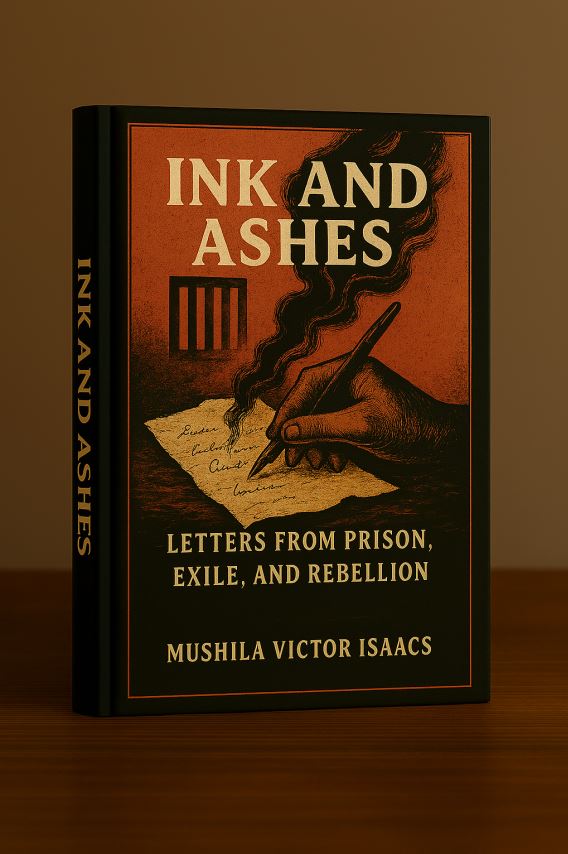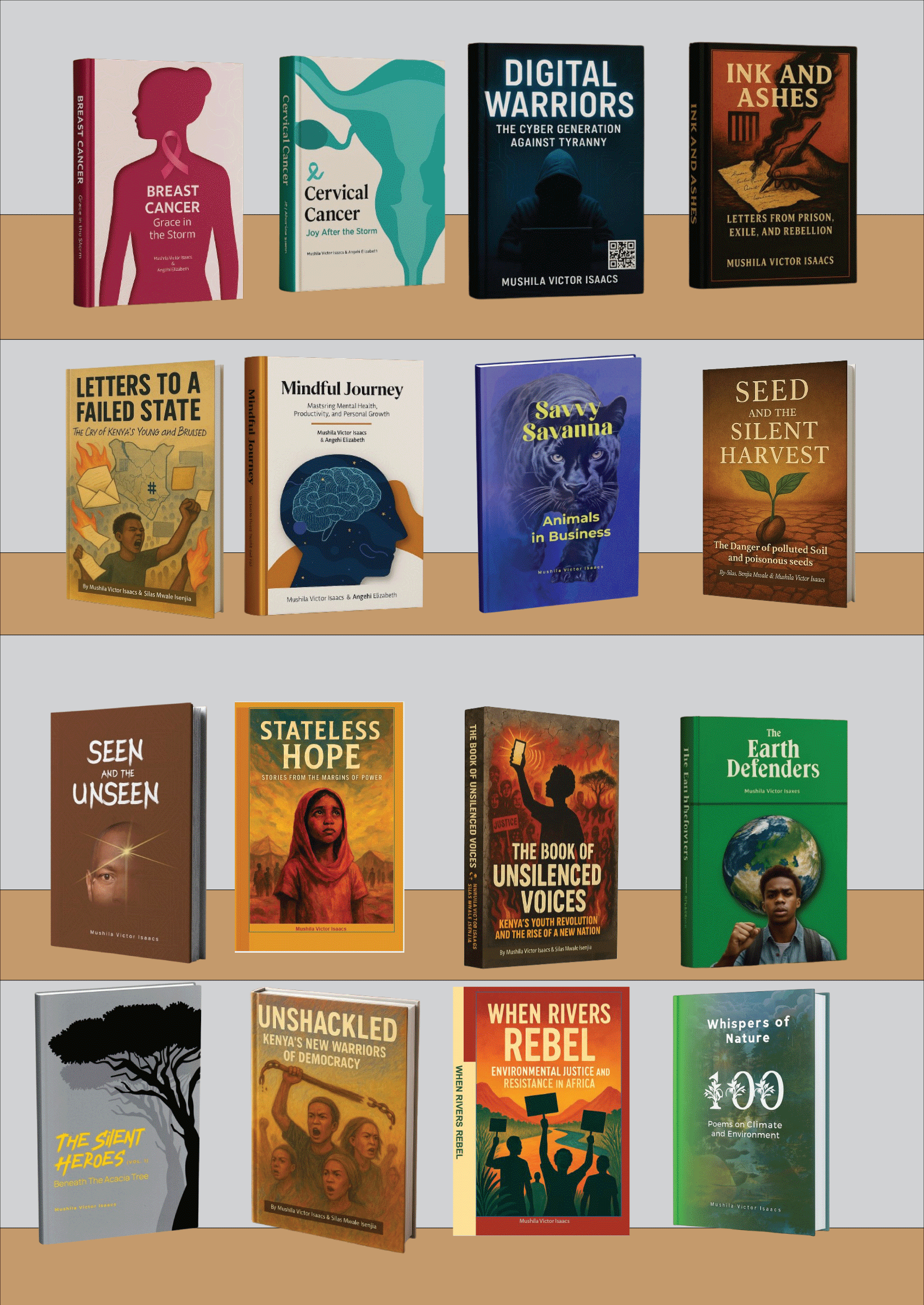
INK AND ASHES
Letters from Prison, Exile, and Rebellion — Chapter 1
Pay per chapter: Ksh 20. Full book: Ksh 350 (M-Pesa Paybill).
Chapter 1 — The Letter They Failed to Bury
They searched me three times that morning. Their hands were colder than the steel clasped around my ankles — trembling not from compassion, but from a bureaucratic eagerness to find something they could confiscate. They were hunting for a voice. But they did not understand: my voice was not in my pocket. It was not beneath my tongue. It was not scribbled in the seams of my threadbare tunic.
They searched me three times that morning. Their hands were colder than the steel clasped around my ankles — trembling not from compassion, but from a bureaucratic eagerness to find something they could confiscate. They were hunting for a voice. But they did not understand: my voice was not in my pocket. It was not beneath my tongue. It was not scribbled in the seams of my threadbare tunic.
My voice was in my memory.
And memory, comrade, is fire!
I write to you from a place that officially does not exist. A prison with no name, renamed three times in two years to confuse reporters and erase survivors. The walls whisper their original name at night, in the language of rats and leaking pipes and men who vanish before dawn. Welcome to the Republic of Nowhere, where simply existing is considered an act of rebellion.
They imprisoned me under the charge of “disrupting national harmony.” A phrase lacquered in such state-sponsored irony it might as well be a threat disguised as a hymn. My true crime? I refused to unsee what I had witnessed. I documented a boy, unnamed and unarmed, shot through the chest in Turkana — and now I am here, entombed between silence and madness.
The cell has no window. Time is not counted in hours but in shivers and hunger. Some nights they flood the floor with brackish water. Other nights they blow cold air through the vents until our teeth rattle like marbles in a jar. This is not discipline. It is erasure — of body, of narrative, of memory.
Do you remember Abdalla, the old teacher from Eritrea? He once told us, “Memory is the most dangerous weapon under tyranny. Not the bullet. Not the ballot. But memory.” Because memory stitches together what oppression tries to shred apart. That is why they rename us. Strip us of our languages. Ban our songs. Confiscate our lullabies. Because memory carries continuity — and continuity is subversion.
There’s a crack in the wall behind my mat. I found it after eight days of fever and silence. I whisper fragments into it: names, events, small truths too dangerous to keep inside. The crack has become my archive. If I disappear tomorrow, may the wall remember me.
In Block D, we had a poet. They called him Mwalimu. He used old proverbs to slip past the censors, speaking in riddles they couldn’t decode. One night they beat him so badly he forgot his own name. But even as his lips split and eyes swelled shut, he repeated one line like a liturgy: “He who buries truth digs a grave for himself.” That frightened them. Not the blade hidden in his shoe, but the metaphor curled on his tongue. Eventually, they moved him to the Black Corridor — where stories go to die.
At first, I planned to document everything — names, methods, timelines. But days melt into vapor here. Time unravels. Now, I only write in fragments. Maybe that is all history really is — the fragments they failed to burn in time.
The guards don’t fear language. They fear rhythm. A lullaby can outlive a regime. Even now, children in the camps still hum forbidden songs under blankets, passing down banned history one note at a time. Even grief has become contraband.
I once caught my own reflection in a broken rearview mirror during a prison transfer. I looked unfamiliar — thinner, hollowed, undone. But my eyes still burned with questions: Why does justice fear the light? Why are our martyrs only canonized once they’re cold? Why do our revolutions keep forgetting their poets?
There’s a boy here who draws with ash and soap. He hides his sketches behind bricks. His latest drawing: a woman cradling a baby whose mouth was sewn shut. Below it, he wrote: “Freedom is the first meal we forget the taste of.” They beat him for that drawing, but now it lives in ten cells — etched again and again into concrete. That’s how ideas live. Not in monuments, but in repetition.
We are all authors here — involuntary scribes. Some write in blood. Others in code. One woman carved her testimony into the underside of a wooden bench using a metal shard she hid in her cheek for two years. She died last winter. But the bench remains. The bench tells the story.
This letter is not an act of courage. I am afraid every single day. But fear is a terrain I’ve learned to walk barefoot. I write to insist that I exist. That we existed. That truth leaves fingerprints, even after the state burns the hand.
If this letter survives the censors, then let it be known: we are not echoes. We are not shadows. We are the sentence they failed to redact. And if you find this buried in a wall, years from now, in a country that no longer imprisons memory — do one thing.
Speak the names aloud.
And if you can — write back.
Pay with M-Pesa Paybill
Business Number (Paybill): 714888
Account Number: 372422
Steps: Open M-Pesa → Lipa na M-Pesa → Paybill → enter 714888 and Account 372422 → Amount: 20 (for chapter) or 350 (full book) → Enter your PIN → Confirm.
After you submit the transaction code the chapter will be revealed immediately (client-side). Please keep the code and the SMS receipt for your records.
